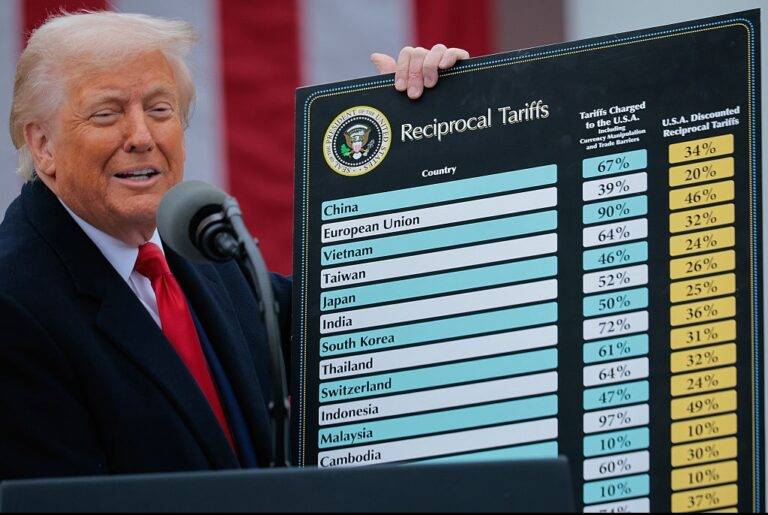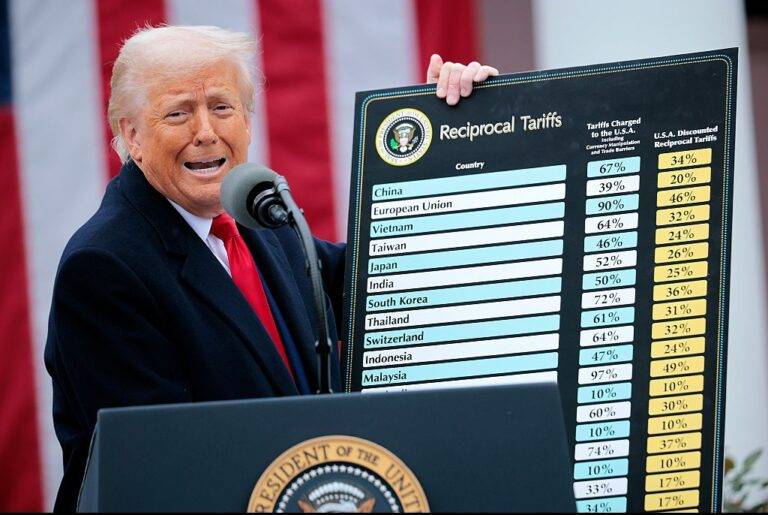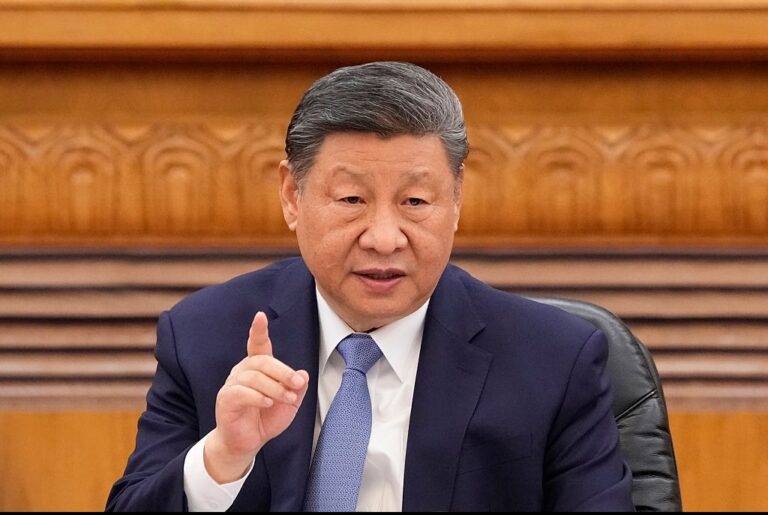
1 22
From the White House Rose Garden, Trump proclaimed April 2, 2025, as a pivotal moment in U.S. trade history.
“This is Liberation Day,” Trump declared. “We’ve been waiting for a long time. April 2, 2025, will forever be remembered as the day American industry was reborn, the day America’s destiny was reclaimed, and the day that we began to ‘Make America Wealthy Again.’”
He accused nations of decades of trade exploitation, stating, “For decades, our country has been looted, pillaged, raped, and plundered by nations, near and far, from both friend and foe alike.”
A blanket 10% tariff was imposed on most imports, but the measures didn’t end there. Dozens of countries labeled as “worst offenders” are facing even steeper charges, with some tariffs reaching up to 54%. China, in particular, faced one of the largest tariff increases.
“They do it to us, and we do it to them. Doesn’t get much simpler than that,” he said.
Markets reacted swiftly. London’s FTSE 100 fell 26.32 points, closing at 8,608.48, while Asian stocks saw significant declines overnight.
Economists are already warning that the fallout will be harsh for both consumers and businesses.
European Commission President Ursula von der Leyen didn’t mince words in her response, describing it as a “major blow to the world economy” and cautioning, “The consequences will be dire for millions of people around the globe.”
She added, “This is especially hurting the most vulnerable citizens,” pointing to rising costs for essentials like groceries, transportation, and medicine.
In retaliation to Trump’s sweeping 54% tariff, China is imposing a new 34% tariff on U.S. goods, effective April 10.
Beijing’s finance ministry strongly condemned the U.S. move, arguing that it violates international trade law. “The U.S. tariffs on Chinese products are not in line with international trade rules,” the ministry stated, according to BBC News.
A spokesperson from China’s commerce ministry stated, “It is a typical unilateral bullying practice that endangers the stability of the global economic and trade order. China firmly opposes this.”
The spokesperson further argued that Trump’s measures “seriously violate WTO rules,” “damage the legitimate rights and interests of WTO members,” and “undermine the rules-based multilateral trading system.”
In response, China has filed an official complaint with the World Trade Organization and unveiled new export controls on rare earth elements—critical materials used in tech products like smartphones, electric vehicles, and computer chips.
Tariffs Imposed by Trump’s Administration:
-
China: 34% (Rising to 54% with additional tariffs)
-
European Union: 20%
-
Vietnam: 46%
-
Taiwan: 32%
-
Japan: 24%
-
India: 26%
-
South Korea: 25%
-
Thailand: 36%
-
Switzerland: 31%
-
Indonesia: 32%
-
Malaysia: 24%
-
Cambodia: 49%
-
United Kingdom: 10%
-
South Africa: 30%
-
Brazil: 10%
-
Bangladesh: 37%
-
Singapore: 10%
-
Israel: 17%
-
Philippines: 17%
-
Chile: 10%
-
Australia: 10%
-
Pakistan: 29%
-
Turkey: 10%
-
Sri Lanka: 44%
-
Colombia: 10%
-
Peru: 10%
-
Nicaragua: 18%
-
Norway: 15%
-
Costa Rica: 10%
-
Jordan: 20%
-
Dominican Republic: 10%
-
United Arab Emirates: 10%
-
New Zealand: 10%
-
Argentina: 10%
-
Ecuador: 10%
-
Guatemala: 10%
-
Honduras: 10%
-
Madagascar: 47%
-
Myanmar: 44%
-
Tunisia: 28%
-
Kazakhstan: 27%
-
Serbia: 37%
-
Egypt: 10%
-
Saudi Arabia: 10%
-
El Salvador: 10%
-
Côte d’Ivoire: 21%
-
Laos: 48%
-
Botswana: 37%
-
Trinidad and Tobago: 10%
-
Morocco: 10%
-
Algeria: 30%
-
Oman: 10%
-
Uruguay: 10%
-
Bahamas: 10%
-
Lesotho: 50%
-
Ukraine: 10%
-
Bahrain: 10%
-
Qatar: 10%
-
Mauritius: 40%
-
Fiji: 32%
-
Iceland: 10%
-
Kenya: 10%
-
Liechtenstein: 37%
-
Guyana: 38%
-
Haiti: 10%
-
Bosnia and Herzegovina: 35%
-
Nigeria: 14%
-
Namibia: 21%
-
Brunei: 24%
-
Bolivia: 10%
-
Panama: 10%
-
Venezuela: 15%
-
North Macedonia: 33%
-
Ethiopia: 10%
-
Ghana: 10%
-
Moldova: 31%
-
Angola: 32%
-
Democratic Republic of the Congo: 11%
-
Jamaica: 10%
-
Mozambique: 16%
-
Paraguay: 10%
-
Zambia: 17%
-
Lebanon: 10%
-
Tanzania: 10%
-
Iraq: 39%
-
Georgia: 10%
-
Senegal: 10%
-
Azerbaijan: 10%
-
Cameroon: 11%
-
Uganda: 10%
-
Albania: 10%
-
Armenia: 10%
-
Nepal: 10%
-
Sint Maarten: 10%
-
Falkland Islands: 41%
-
Gabon: 10%
-
Kuwait: 10%
-
Togo: 10%
-
Suriname: 10%
-
Belize: 10%
-
Papua New Guinea: 10%
-
Malawi: 17%
-
Liberia: 10%
-
British Virgin Islands: 10%
-
Afghanistan: 10%
-
Zimbabwe: 18%
-
Benin: 10%
-
Barbados: 10%
-
Monaco: 10%
-
Syria: 41%
-
Uzbekistan: 10%
-
Republic of the Congo: 10%
-
Djibouti: 10%
-
French Polynesia: 10%
-
Cayman Islands: 10%
-
Kosovo: 10%
-
Curaçao: 10%
-
Vanuatu: 22%
-
Rwanda: 10%
-
Sierra Leone: 10%
-
Mongolia: 10%
-
San Marino: 10%
-
Antigua and Barbuda: 10%
-
Bermuda: 10%
-
Eswatini: 10%
-
Marshall Islands: 10%
-
Saint Pierre and Miquelon: 50%
-
Saint Kitts and Nevis: 10%
-
Turkmenistan: 10%
-
Grenada: 10%
-
Sudan: 10%
-
Turks and Caicos Islands: 10%
-
Aruba: 10%
-
Montenegro: 10%
-
Saint Helena: 10%
-
Kyrgyzstan: 10%
-
Yemen: 10%
-
Saint Vincent and the Grenadines: 10%
-
Niger: 10%
-
Saint Lucia: 10%
-
Nauru: 30%
-
Equatorial Guinea: 13%
-
Iran: 10%
-
Libya: 31%
-
Samoa: 10%
-
Guinea: 10%
-
Timor-Leste: 10%
-
Montserrat: 10%
-
Chad: 13%
-
Mali: 10%
-
Maldives: 10%
-
Tajikistan: 10%
-
Cabo Verde: 10%
-
Burundi: 10%
-
Guadeloupe: 10%
-
Bhutan: 10%
-
Martinique: 10%
-
Tonga: 10%
-
Mauritania: 10%
-
Dominica: 10%
-
Micronesia: 10%
-
Gambia: 10%
-
French Guiana: 10%
-
Christmas Island: 10%
-
Andorra: 10%
-
Central African Republic: 10%
-
Solomon Islands: 10%
-
Mayotte: 10%
-
Anguilla: 10%
-
Cocos (Keeling) Islands: 10%
-
Eritrea: 10%
-
Cook Islands: 10%
-
South Sudan: 10%
-
Comoros: 10%
-
Kiribati: 10%
-
São Tomé and Príncipe: 10%
-
Norfolk Island: 29%
-
Gibraltar: 10%
-
Tuvalu: 10%
-
British Indian Ocean Territory: 10%
-
Tokelau: 10%
-
Guinea-Bissau: 10%
-
Svalbard and Jan Mayen: 10%
-
Heard and McDonald Islands (uninhabited): 10%
-
Réunion: 37%






